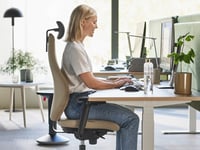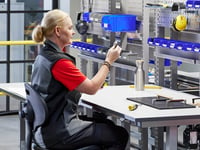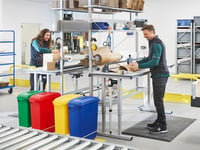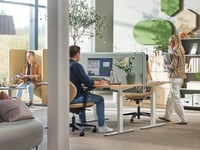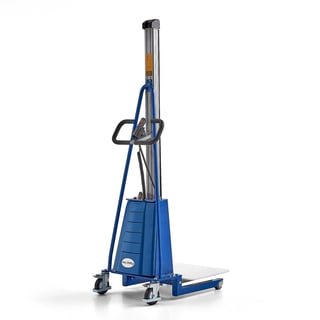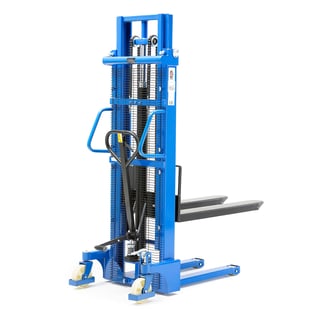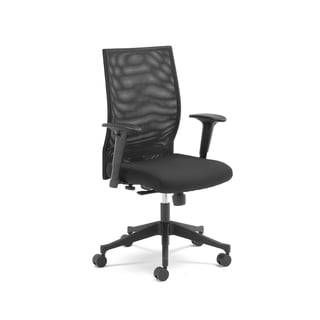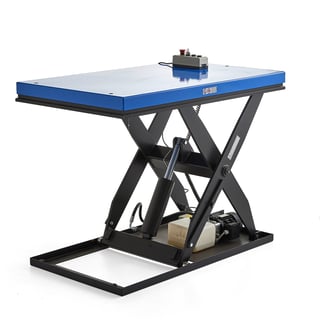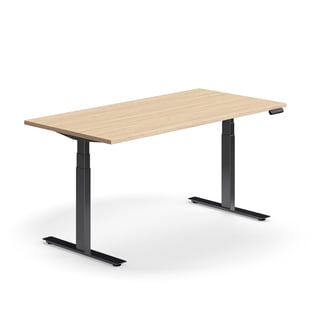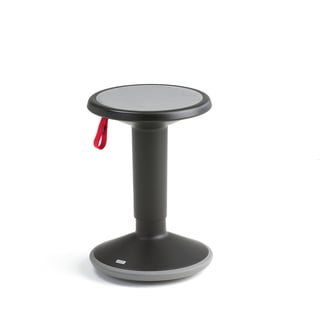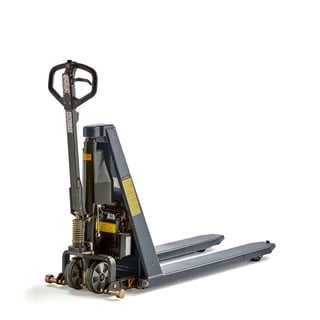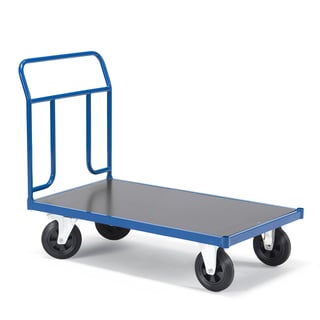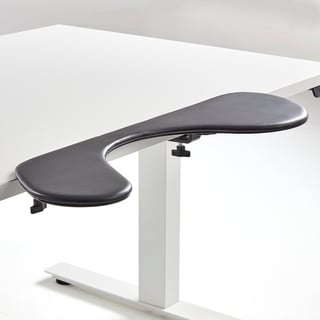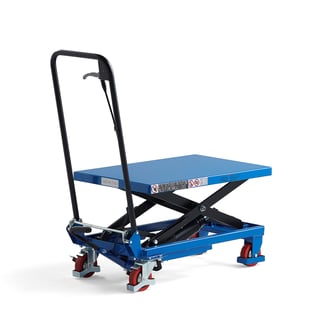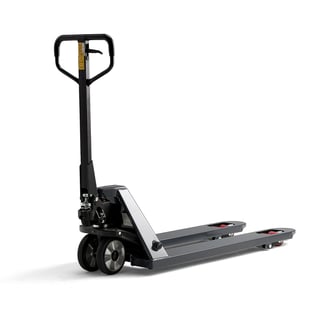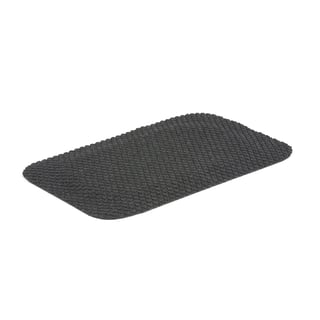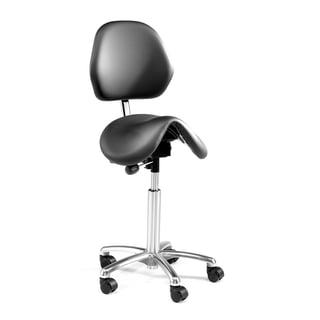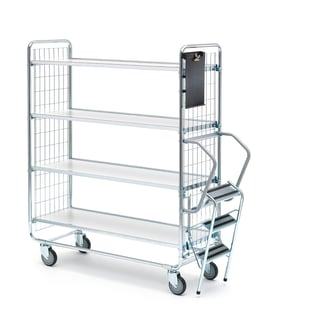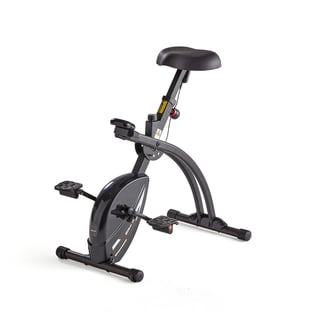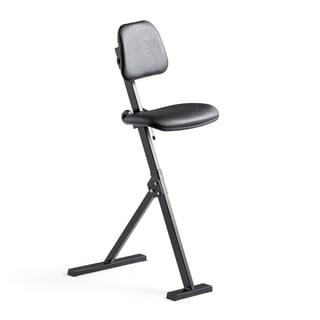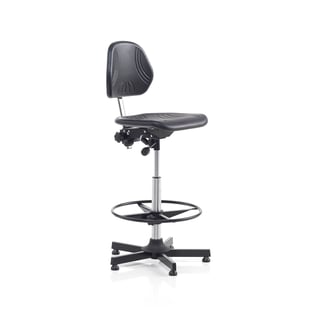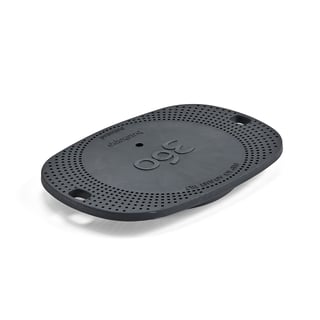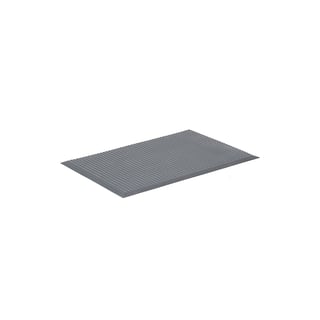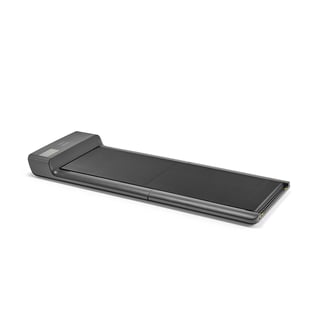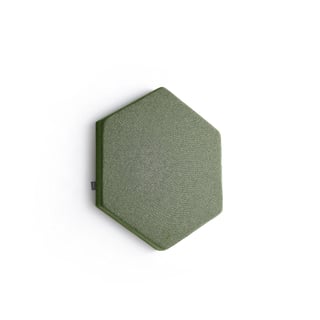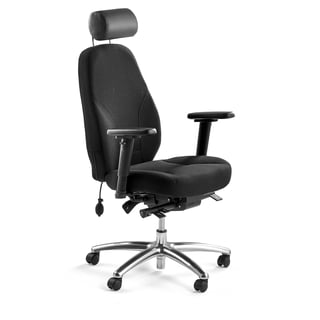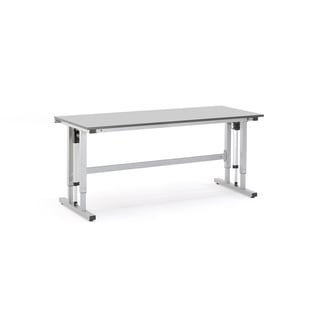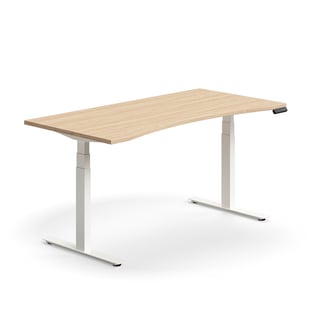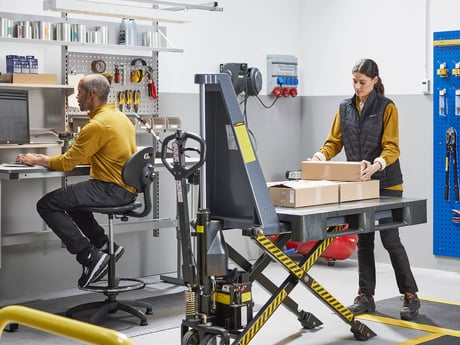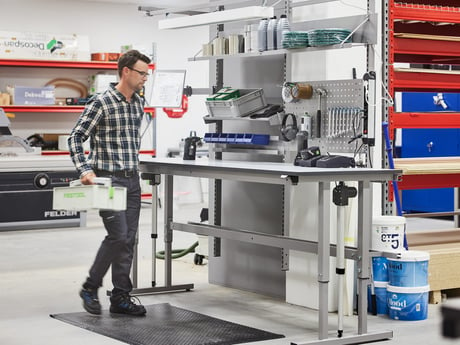- AJ Products UK
- Blog: Tips to Inspire Happiness at Work
- Ergonomics in the workplace
- Ergonomics for the entire workplace
Ergonomics for the entire workplace
More than half of all workers experience aches and pains caused by their work. Discomfort such as stiffness, fatigue, and general strain that can often be avoided with the right ergonomic solutions. Adjustable workstations help reduce strain, lifting and transport aids take pressure off the body, and well-planned lighting and acoustics support better focus. Even simple additions like greenery can help lower stress levels. Together, these measures lead to fewer sick days, higher productivity, and a more enjoyable working environment.
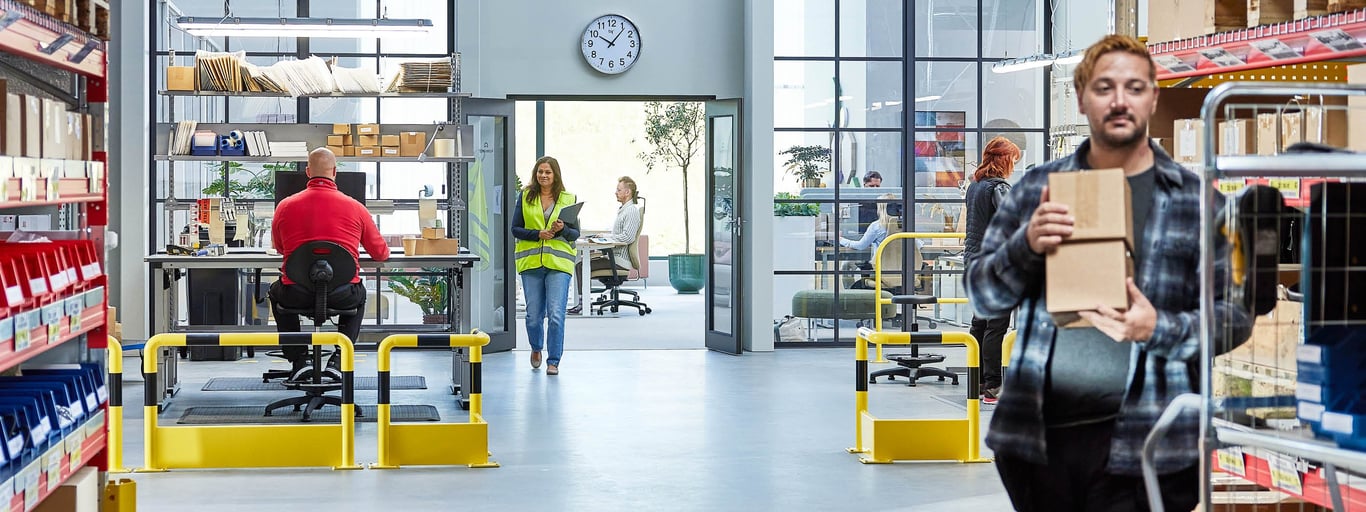
Go directly to section:
- Create an ergonomic desk space
- The workbench that takes the pressure off your body
- Streamline packing with ergonomics
- Lift correctly and avoid strain injuries
- Make moving goods easier with ergonomic trolleys
- How to design for better acoustics
- Brighten up your workday with the right lighting
- Bring nature into your workspace
- Summary
What is ergonomics and why is important?
Ergonomics means adapting work to the individual. It covers physical, mental and social aspects, from how we sit, stand and lift to how light, sound and work tasks are organised. An ergonomic workplace recognises that people have different needs and abilities, such as strength, body size and cognitive capacity, and creates conditions that help everyone work comfortably and effectively. Ergonomics is therefore not only a matter of health, but also a wise investment that leads to healthier employees and higher productivity.
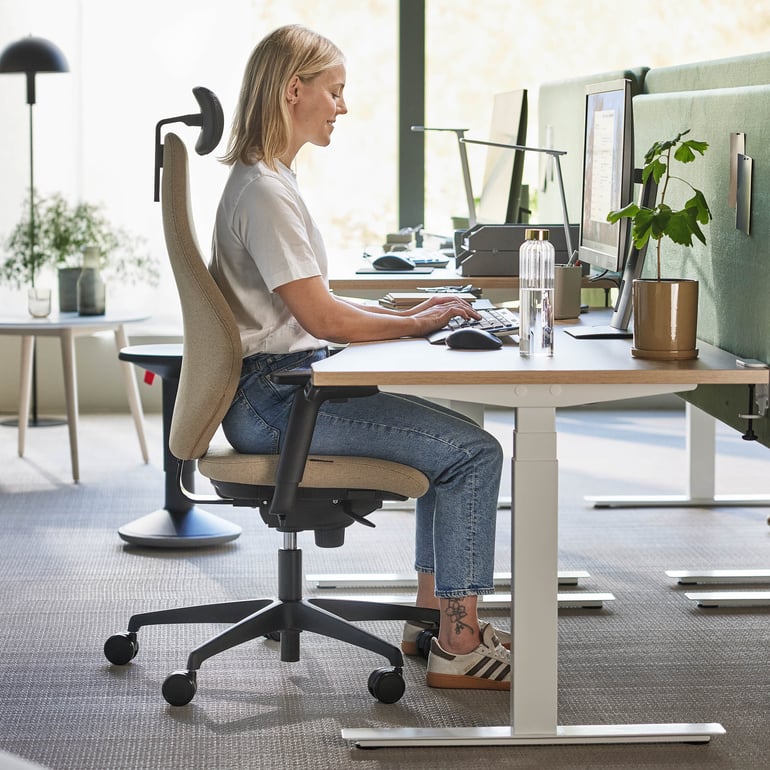
Create an ergonomic desk space
Many of us spend around eight hours a day at our desks, often leaning forward with tense shoulders and a stiff back. This can easily lead to neck, back and wrist pain. A good office chair or stool combined with a height- adjustable desk forms the foundation of an ergonomic desk setup. Position your screen at eye level, adjust your chair so both your back and legs are properly supported and make sure your forearms can rest comfortably on the desk. Switch between sitting and standing regularly. Consider adding ergonomic accessories such as a footrest, monitor arm or anti-fatigue standing mat to further reduce strain.
The workbench that takes the pressure off your body
A day at the workbench often involves long periods of standing or sitting, leaning forward over the surface, or reaching upwards for tools and materials. This can take a toll on the body, leading to tense shoulders, a tired back, and stiff joints.
A height-adjustable workbench make it easy to work at the correct height and switch between standing and sitting. Adjust the bench top to suit the task and place tools and materials close to your body to minimise unnecessary movements. Complete the setup with an adjustable workshop chair or sit-stand chair for variety and an ergonomic work mat that reduces strain during longer shifts.
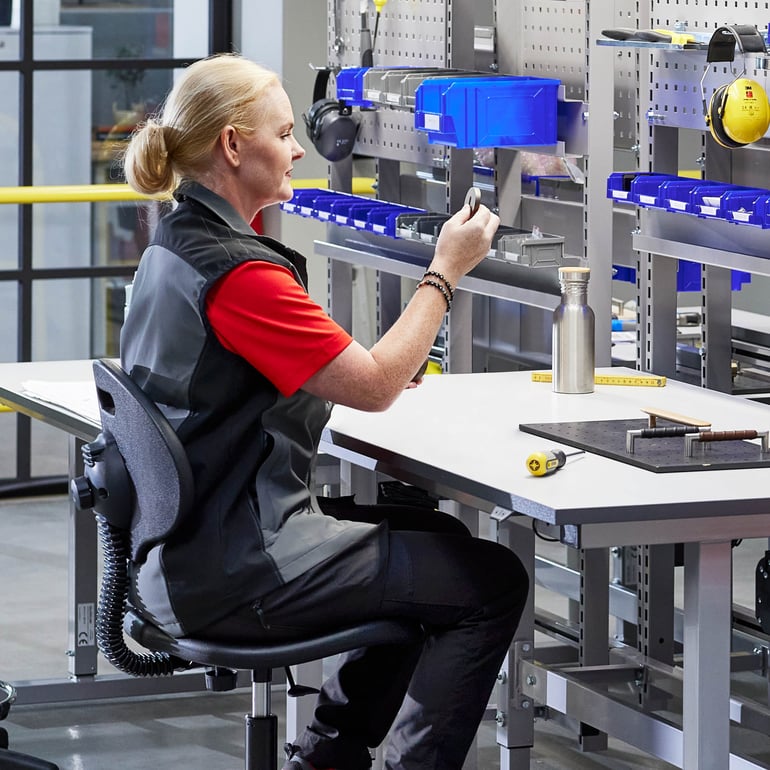

Invest in ergonomic workstations and get up to 15 times your money back.
International studies show that ergonomic improvements can provide an ROI of between 3 and 15 times the investment (Puleio & Zhao, Return on Investment for Ergonomics Interventions, Humanscale, 2015).
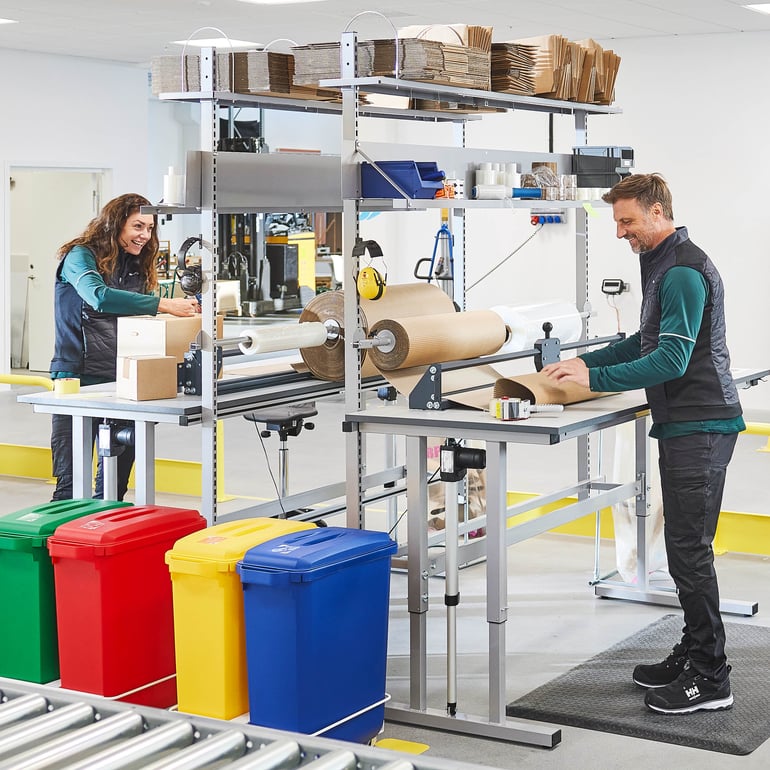
Streamline packing with ergonomics
Packing work often involves repetitive movements that put strain on the shoulders, arms and back. Height-adjustable packing benches, allow each employee to work at the right height and switch between sitting and standing. Work tables with integrated rollers or roller conveyors make it easier and faster to move goods without heavy lifting. Keep materials close at hand using smart storage solutions, and complement the setup with an ergonomic chair or standing support. Lifting tables and scissor lift trolleys relieve strain on the back and contribute to a more efficient and sustainable workflow over time.
Discover our blogs about ergonomics in the workplace
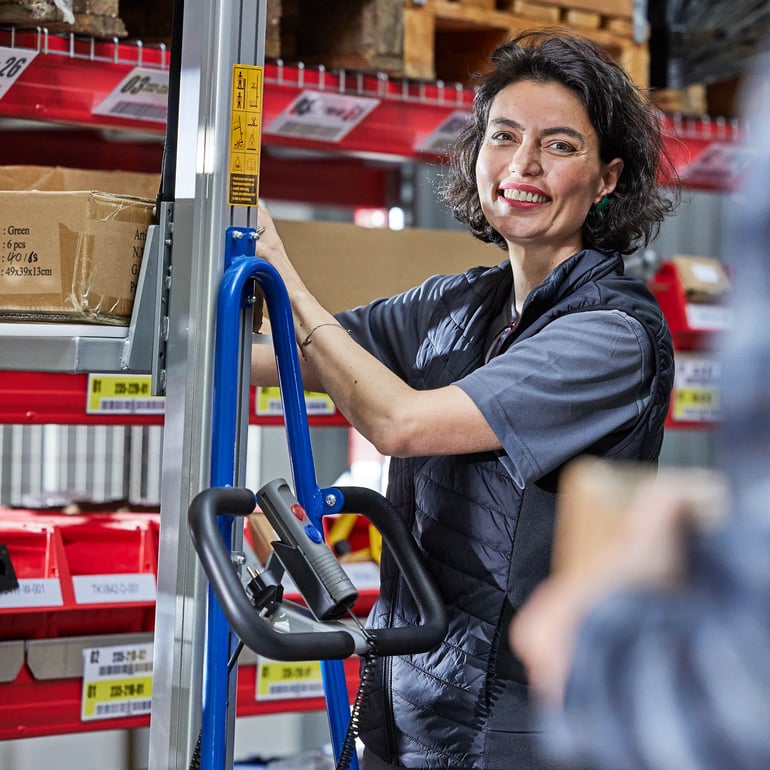
Lift correctly and avoid strain injuries
In many workplaces, heavy lifting is a regular part of the job. It's important to lift correctly to prevent strain and injury. Where possible, avoid lifting altogether and try to push, pull or roll the load instead. When you need to lift, keep the following in mind:
- Plan the lift in advance and make sure the path is clear of obstacles.
- Keep the load close to your body and bend your knees rather than your back. Avoid twisting - turn with your whole body instead.
- Use aids such as trolleys, pallet trucks or lifting tables for heavier loads.
Using the correct lifting technique and the right tools protects your back and makes work both safer and more efficient.
Make moving goods easier with ergonomic trolleys
A typical day at work can involve a lot of lifting, big and small. With ergonomic transport trolleys, you can avoid heavy lifting and have a smoother working day. Choose a trolley suited to the load and environment, for example shelf trolleys and workshop trolleys in the office, catering trolleys in the canteen, or platform trolleys and long material trolleys in the warehouse. The right trolley eases the strain on your body and makes work safer, easier and more ergonomic.
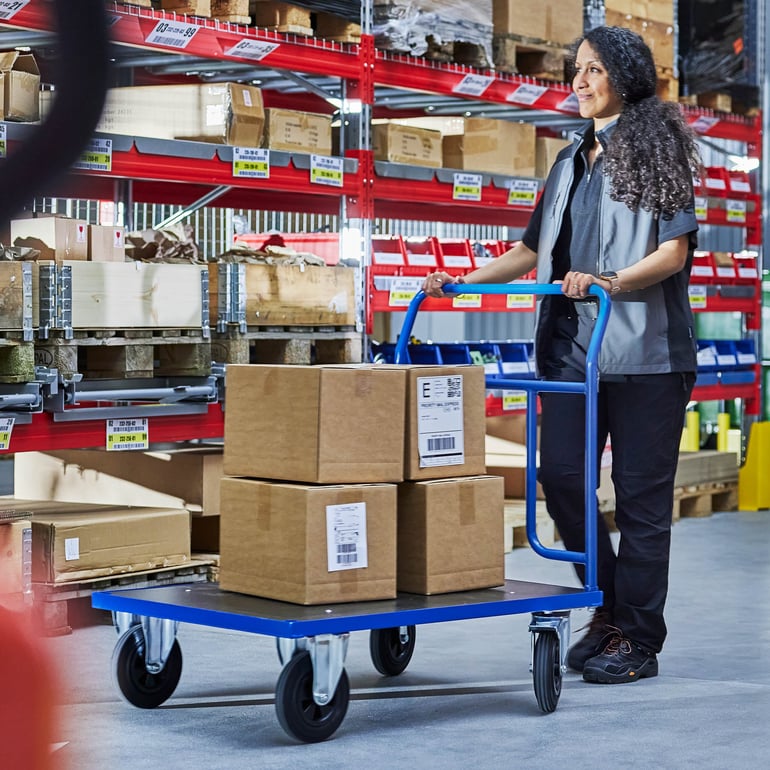
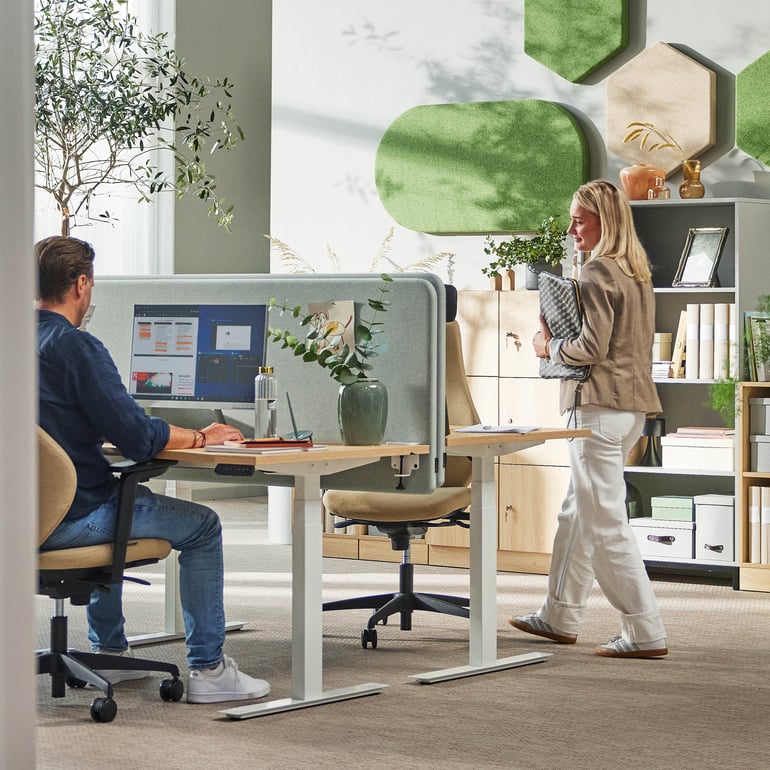
How to design for better acoustics
Distracting noise in the workplace affects both concentration and well-being. A good sound environment is an important part of workplace ergonomics. Floor screen dividers, wall panels and acoustic ceiling panels can reduce the noise levels and create quieter workspaces. Sound-absorbing textiles, carpets and furniture also help to dampen sound while making the environment more comfortable. The result is less stress and more job satisfaction.

Invest in an ergonomic sound environment and improve concentration by up to 50%
Research shows that the right sound environment in the office reduces stress and improves focus, leading to higher productivity (Haworth, The Effect of Sound on Workplace Productivity, 2024).
Brighten up your workday with the right lighting
Many people don't notice how much lighting affects their body until fatigue or headaches start to appear. Poor lighting can cause strain in the eyes, neck and shoulders, but with the right lighting setup you can prevent these problems.
Visual ergonomics is about adapting the light to your eyes, your tasks and your workspace. Let in daylight when possible and supplement it with even general lighting and an adjustable desk lamp. This combination creates a well-lit environment that energises and makes the workday more enjoyable.
Visual ergonomics is about adapting the light to your eyes, your tasks and your workspace. Let in daylight when possible and supplement it with even general lighting and an adjustable desk lamp. This combination creates a well-lit environment that energises and makes the workday more enjoyable.
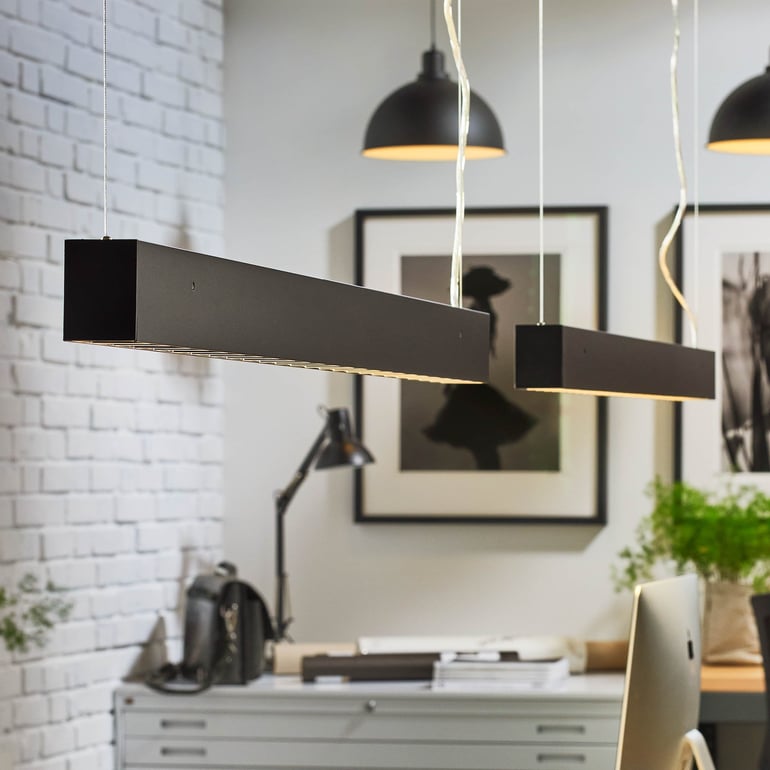

Good lighting in the office can reduce sick leave by up to 25%
Several work environment studies show that the right light levels and color temperatures reduce stress and fatigue, leading to fewer sick days (CIE, 2019; Boyce et al., 2003).

Bring nature into your workplace
Many offices are dominated by hard surfaces and neutral colors, which can easily make the environment feel monotonous and stressful. Introducing biophilic elements by allowing plants, daylight and natural materials to take their place, you create a calmer and more inspiring work environment. Plants reduce stress levels, increase well-being and can even increase productivity. Artificial plats also work well because they require minimal maintenance but give the same green feeling. Biophilic design is more than just aesthetic; a green, thoughtfully designed workplace can also help attract and retain employees, giving your business a competitive edge.
Summary
Ergonomics is about adapting work to the individual across the whole business. When desks, packing tables, lifts and transport solutions are set to the right height and combined with the right aids, strain is reduced and energy lasts longer. Optimised sound, light and greener environments create focus and well-being. Research shows that the right ergonomic solutions can reduce sick leave, prevent musculoskeletal disorders and boost productivity. Ergonomics is therefore not a cost, but a smart investment that can pay off many times over through healthier employees and stronger results over time.
Need help? Ask our experts!
We at AJ Products are always available to help you with solutions suited just for your business. Contact us if you have questions on the choice of fabric, need some inspiration or want to know the alternatives that would best suit your premises. We can then tell you more about your choices.Discover our blogs about ergonomics in the workplace
FAQ
- To adapt work, equipment and environment to the individual to reduce risks, prevent injuries, and increase both well-being and performance.
- Pain in the neck, shoulders, back and arms is the most common. It is often caused by heavy lifting, poor posture or prolonged sitting, and can often be prevented with small changes.
- Recurring complaints of fatigue, stiffness or pain are a clear signal. High sick leave, many monotonous work tasks or lack of assistive devices are also signs that ergonomics need to be improved.
- No, on the contrary. Heavy lifting, monotonous movements and fast pace in warehouses and industry mean an even greater need for ergonomic solutions. All workplaces benefit from better ergonomics.
- Start with small adjustments: a properly adjusted chair, a screen at eye level, and materials close to your body. Then gradually introduce assistive devices like height-adjustable tables, mats, or carts to reduce strain. Small changes to your workday can quickly make a big difference.
- Yes. Research shows that ergonomic solutions reduce sick leave, increase productivity and make work more sustainable in the long term. An investment in ergonomics quickly pays off through healthier employees and a more efficient workflow.
Get the latest product launches and offers sent direct to your inbox
Do you want to receive exclusive offers, information about new products and inspiration on how you can improve your workplace? Sign up for our free newsletter and be the first to receive our best offers.Please wait...
*By clicking subscribe, I confirm that I have read the privacy policy.
